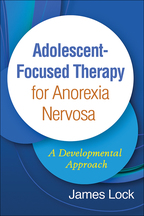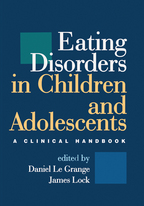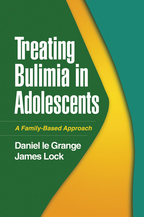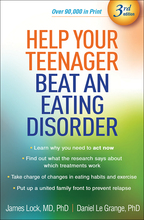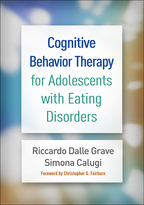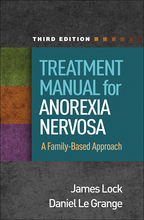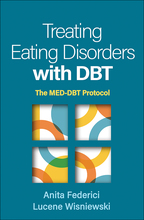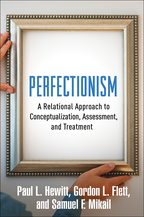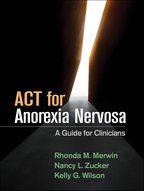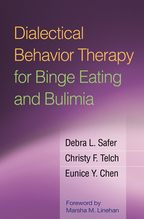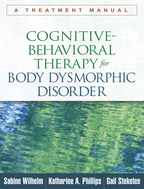Adolescent-Focused Therapy for Anorexia Nervosa
A Developmental Approach
James Lock
Hardcovere-bookprint + e-book
Hardcover
orderApril 28, 2020
ISBN 9781462542840
Price: $43.00 228 Pages
Size: 6" x 9"
Sign up for emails on upcoming titles on Families & Couples (with special discounts)!
“This is a well done and timely book….It is well laid out, well presented, and has, especially in the latter chapters, a great deal of dialogue between therapist and patient to clarify and highlight points made. Even though AFT has developed from a psychodynamic base, it will be comfortable reading for those with a more behavioral background….This book could be used in any graduate program where eating disorders are part of the curriculum. The book could also be helpful reading for any practitioner currently involved with or with an interest in developing increasing expertise in this field.”

—Child and Family Behavior Therapy
“Although family-based treatment is the first-line approach to adolescent AN, not all parents are comfortable with it, and some prefer an individually focused treatment. AFT, shown to be effective in clinical trials, is a useful alternative to family-based treatment. Lock presents the main elements of AFT clearly and effectively, with helpful clinical vignettes. All those who treat AN should read this book in order to provide the full range of treatments for their patients.”

—W. Stewart Agras, MD, Department of Psychiatry and Behavioral Sciences (Emeritus), Stanford University
“AFT is supported by empirical evidence, but, until now, only limited resources were available to guide clinicians in implementation. This much-needed manual provides a detailed description of AFT, replete with case material that brings the approach to life. The book will be of use to a wide range of readers, from students who want to learn more about this evidence-based treatment to seasoned therapists seeking to add another effective treatment to their clinical repertoires. The availability of a treatment manual can also facilitate clinical research, ultimately adding to our understanding of adolescent eating disorders.”

—Renee D. Rienecke, PhD, FAED, Director of Research, Eating Recovery Center/Insight Behavioral Health Centers; Department of Psychiatry and Behavioral Sciences, Northwestern University
“Perhaps not surprisingly, families have proven to be the most valuable resource in helping adolescents with AN. However, there are situations where an individual treatment strategy may be more appropriate and helpful. Moye and Robin’s early work on ego-oriented individual therapy put individual treatment for AN on the map, and AFT represents this approach's further refinement. Lock, a leading treatment developer for eating disorders in young people, provides an excellent clinical guide to the practical steps required to implement AFT.”

—Daniel Le Grange, PhD, Benioff UCSF Professor in Children’s Health, Department of Psychiatry, University of California, San Francisco; Emeritus Professor of Psychiatry and Behavioral Neuroscience, The University of Chicago
“Lock provides a rationale and a step-by-step approach for using AFT. The manual describes AFT from a biopsychosocial perspective that takes stages of adolescent development into account to tailor treatment according to individual needs. While AFT has its roots in developmental–psychodynamic theory, it nevertheless can be aligned with the assumptions of the medical model. This is key to reduce stigma and introduce more transparency to treatment of AN. The well-structured manual provides detailed examples of how AFT can target specific problems in meeting developmental milestones during adolescence. This is a very useful guide for applying AFT with adolescents for whom family-based therapy has not been a feasible option.”

—Guido K. W. Frank, MD, Department of Psychiatry, University of California, San Diego; UCSD Eating Disorder Center for Treatment and Research
—Child and Family Behavior Therapy
“Although family-based treatment is the first-line approach to adolescent AN, not all parents are comfortable with it, and some prefer an individually focused treatment. AFT, shown to be effective in clinical trials, is a useful alternative to family-based treatment. Lock presents the main elements of AFT clearly and effectively, with helpful clinical vignettes. All those who treat AN should read this book in order to provide the full range of treatments for their patients.”
—W. Stewart Agras, MD, Department of Psychiatry and Behavioral Sciences (Emeritus), Stanford University
“AFT is supported by empirical evidence, but, until now, only limited resources were available to guide clinicians in implementation. This much-needed manual provides a detailed description of AFT, replete with case material that brings the approach to life. The book will be of use to a wide range of readers, from students who want to learn more about this evidence-based treatment to seasoned therapists seeking to add another effective treatment to their clinical repertoires. The availability of a treatment manual can also facilitate clinical research, ultimately adding to our understanding of adolescent eating disorders.”
—Renee D. Rienecke, PhD, FAED, Director of Research, Eating Recovery Center/Insight Behavioral Health Centers; Department of Psychiatry and Behavioral Sciences, Northwestern University
“Perhaps not surprisingly, families have proven to be the most valuable resource in helping adolescents with AN. However, there are situations where an individual treatment strategy may be more appropriate and helpful. Moye and Robin’s early work on ego-oriented individual therapy put individual treatment for AN on the map, and AFT represents this approach's further refinement. Lock, a leading treatment developer for eating disorders in young people, provides an excellent clinical guide to the practical steps required to implement AFT.”
—Daniel Le Grange, PhD, Benioff UCSF Professor in Children’s Health, Department of Psychiatry, University of California, San Francisco; Emeritus Professor of Psychiatry and Behavioral Neuroscience, The University of Chicago
“Lock provides a rationale and a step-by-step approach for using AFT. The manual describes AFT from a biopsychosocial perspective that takes stages of adolescent development into account to tailor treatment according to individual needs. While AFT has its roots in developmental–psychodynamic theory, it nevertheless can be aligned with the assumptions of the medical model. This is key to reduce stigma and introduce more transparency to treatment of AN. The well-structured manual provides detailed examples of how AFT can target specific problems in meeting developmental milestones during adolescence. This is a very useful guide for applying AFT with adolescents for whom family-based therapy has not been a feasible option.”
—Guido K. W. Frank, MD, Department of Psychiatry, University of California, San Diego; UCSD Eating Disorder Center for Treatment and Research

